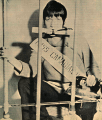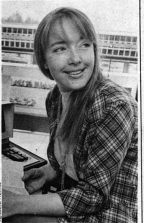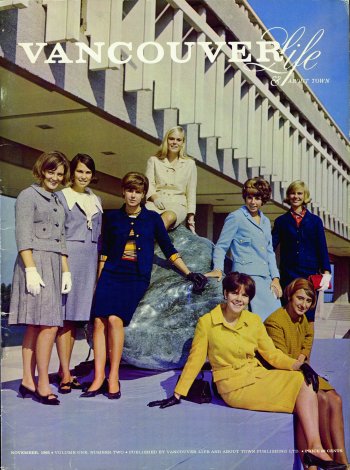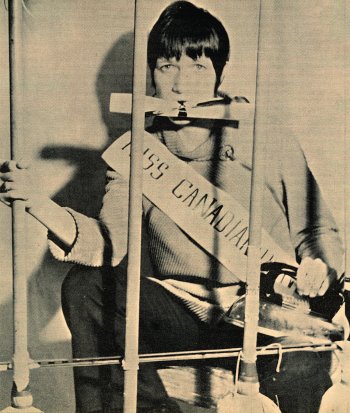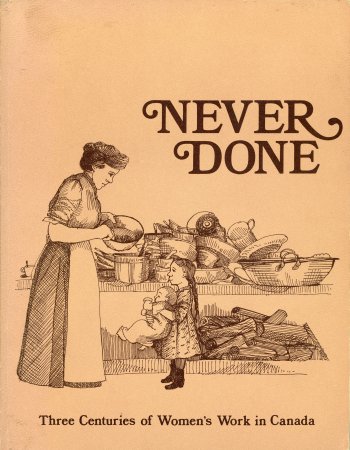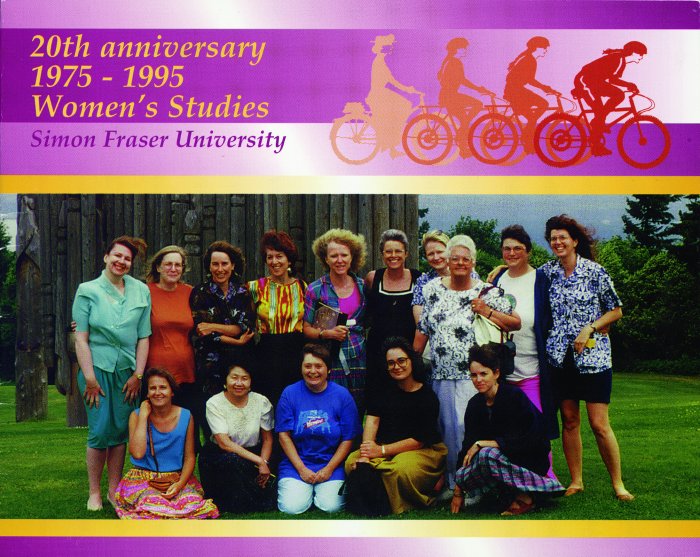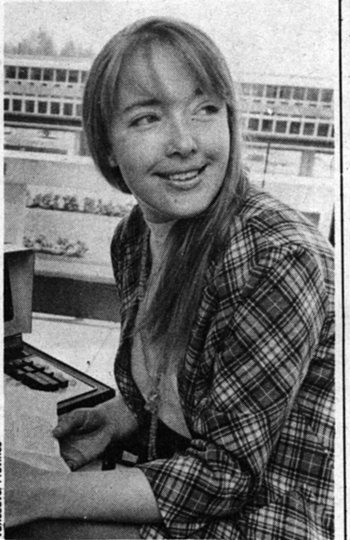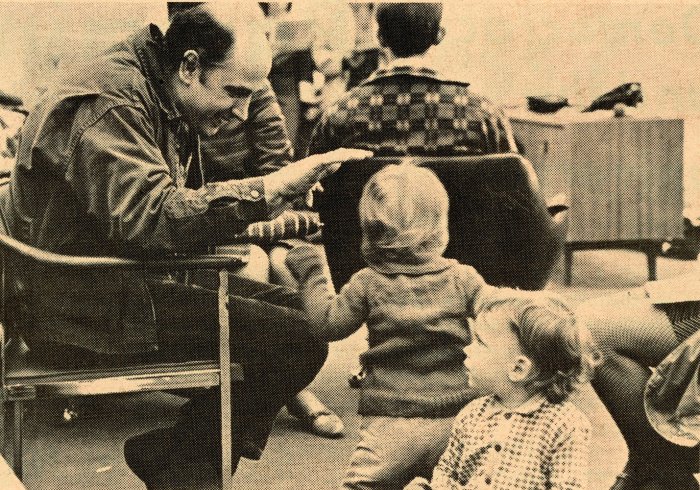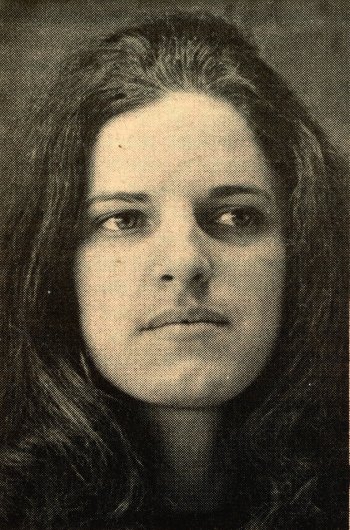How do I find photographs in an archives?
Letty Wilson: SFU's first woman dean. Archives are arranged by provenance - that is, according to the person or group that accumulated the records. So, you need to know the names of the key players or organizations for your research topic. Secondary sources, such as books or journal articles, are a great way to get names. For example, to learn about women administrators in early SFU history, start with Hugh Johnston's Radical Campus to find the name Lolita (Letty) Wilson. The SFU Archives holds the Letty Wilson SFU history collection as well as university records she created in her role as Dean of Student Affairs.
Debutantes pose at SFU in 1965. A picture is worth a thousand words. At SFU, we have an in-house printed index to some of our early photographs but a magazine cover like this can be hard to discover. It's a one-of-a kind image that you won't come across in any catalogue but that you can find by making an appointment with the archivist who knows the collections. Archivists expect to be asked questions and welcome them. Seeking advice is part of your research process. Visit the Contact us page on the SFU Archives web site to learn about our location, hours, and reference services that are available to researchers.
... back to top
Student publications give a fresh point of view. Primary sources make up the bulk of our holdings at the SFU Archives. These are the records naturally created and kept by a person or organization in the course of day-to-day activities. Such records provide valuable evidence of how events occurred as told by the actual participants.
But archives also hold hard-to-find contemporary published materials, which can be useful to determine public opinion at the time. Textual and pictorial material from two student publications - the SFU Yearbook (published by the Simon Fraser Student Society) and The Peak student newspaper - dramatically illustrate students' changing perceptions of feminism. In addition, if you visit the SFU Archives in person, we have a card index to the first years of The Peak.
... back to top
Women's Caucus records: how to find them. Some of the records of Vancouver Women's Caucus were acquired by the SFU Archives as part of other collections and do not appear as main headings in our list of finding aids. In order to find such "hidden" material, the researcher can ask an SFU archivist to search our in-house database for specific files relating to Women's Caucus. We will direct you to the records of Women's Caucus in five collections:
Women's Bookstore collection (F-111)
Frances Wasserlein fonds (F-162)
Maggie Benston collection (F-126)
Candice Parker women's movement collection (F-165)
Anne Roberts women's movement collection (F-166)
We have more information on the beauty contest protest movement in the Marge Hollibaugh women's movement collection (F-73).
... back to top
Women's Caucus: meet the key players. Besides books and journal articles, theses are another example of a secondary source. At SFU, theses are listed by subject in the library catalogue. Recent theses are on-line. You can find older theses at the library and at the SFU Archives. Frances Wasserlein's SFU thesis, An Arrow Aimed at the Heart, includes interviews with many early Vancouver feminists including Andrea Lebowitz, Maggie Benston, Anne Roberts and Candace Parker. The SFU Archives holds original papers from all of these women. We also hold the Frances Wasserlein fonds.
Frances Wasserlein fonds (F-162)
Andrea Lebowitz women's movement collection (F-164)
Maggie Benston collection (F-126)
... back to top
Andrea Lebowitz collection: a finding with a personal touch. Archivists describe records rather than catalog them. Each collection (or archival fonds) has its own finding aid. The SFU Archives puts its basic finding aids on-line. Browse the finding aid list and you will see that we have a wide variety of women's archives. If you want to check out the contents of a particular collection, click on the finding aid for the on-line version. You will find helpful background information as well as a complete file list. If you visit the SFU Archives in person, you will see that some of our hard-copy finding aids contain extra reference material in the form of printed articles or personal reminiscences by the creators of the records. For example, the hard copy finding aid for the Andrea Lebowitz collection contains a bonus: an appendix in which Lebowitz provides further information on the collective that wrote She Named It Canada.
Andrea Lebowitz women's movement collection (F-164)
Ellen Frank was another feminist activist in Vancouver who wrote a personal page for her finding aid; see Ellen Frank fonds (F-82)
... back to top
Women's Studies Department: telling the story. Look for different players or different voices to explore your topic of interest. In this case, to tell the history of the Women's Studies department, you can examine official university records from the Women's Studies Department and other university bodies to contrast with the stories told in the personal papers of faculty such as Andrea Lebowitz, Maggie Benston, and student publications such as the Peak student newspaper.
Women's Studies Department fonds (F-63)
Women's Studies Department collection (F-62)
Andrea Lebowitz women's movement collection (F-164)
Peak Publication Society fonds (F-17)
Women's Studies Association of British Columbia fonds (F-75)
... back to top
Maggie Benston: professor, feminist. Secondary sources like books or journals are always a good place to start your research in order to get an overview of your topic. Pay close attention to endnotes, footnotes, and bibliographies that tell you the writer's sources and often the archival institutions in which they are located. If the writer does not mention the location of an archival collection, try searching the BC Archives Union List (BCAUL) or Archives Canada. BCAUL and Archives Canada are databases that aggregate archival descriptions from institutions across BC and Canada respectively.
For example, if you were to find the name "Maggie Benston" in an article about second-wave feminism in Vancouver, a search of BCAUL will tell you that the Maggie Benston archives (or fonds) is held by the SFU Archives. We also hold the Maggie Benston collection, which contains material about her course, Women, Science and Technology. In addition, you can learn about Benston's role as one of the founders of the Society for Canadian Women in Science and Technology.
... back to top
Childcare Society: an example for archival research. Prepare for a personal visit to the archives by checking the Contact us section of our web page for our location, hours, and services to researchers. Then browse our list of on-line finding aids to locate collections of interest. To research the SFU Childcare Society, start with the history of the Childcare Centre contained in the on-line finding aid; check the file lists and look for files that contain a historical overview of the society's history. Another source is a body of materials that document the evolution of the Childcare Centre and which were collected by Mary Wilson, an SFU day-care activist, board and staff member in the early 1970s.
Be sure to note if files are marked "pending review." Archival records are subject to BC's Freedom of Information and Protection of Privacy Act (public records) and the Personal Information Protection Act (private records). Files designated "pending review" cannot be released until they have been examined by an archivist to ensure that the record do not contain third-party personal or confidential information. Keep in mind that reviews can take some time. Send us an e-mail (archives@sfu.ca) before you come to the Archives and let us know which files you are interested in.
... back to top
SFU Women's Centre: linking past and present. Archives arrange and describe records to make them available to researchers. This takes time. Also, organizations do not donate their most recent records to an archives because these records are still in use. So, our on-line finding aids may only list older records. To find out about a person or organization's more recent history, check with the archivist to see if there are any unprocessed records that you might be able to see.
Look also for on-line indexes to sources of information. If you want to find out more about the SFU Women's Centre, try the search engine on the university's home web page. This search engine provides links to on-line articles in The Peak student newspaper, to recent university publications, as well as to the Women's Centre home page.
... back to top
Women at SFU: quick start your inquiry. Sometimes there is an easy way to get acquainted with us here at the SFU Archives. We have a small number of vertical files with information on some of our most popular reference questions. That's an easy way to find articles such as this 1980 piece about the SFU Women's Centre from SFU Week. We also have historical authority files with background information on departments and organizations whose collections we hold. Looking at prepared files isn't typical archival research but it will introduce you to the SFU Archives and our other services for researchers.
Most archival research is fascinating but time consuming. You're trying to tease out information from documents that were not created for you but for another purpose - to carry out the activities of the original records creator. So check our on-line finding aids to plan your research carefully. If the files that you want to see are marked "pending review," send us an e-mail (archives@sfu.ca) for further instructions.
... back to top
Women's archives: a unique strength of the SFU Archives. We're really excited about our women's archives. Women in Canada have a story to tell. They do it through the archival record. What's your interest? Here are a few examples:
Women and children, birth control, abortion, raising children in a non-sexist environment, child care:
Women's Bookstore Collection (F-111): contains records of Vancouver feminist organizations and material collected by the Women's Bookstore Collective on issues of importance to the women's movement.
Ellen Frank fonds (F-82): Vancouver social activist.
Women at work, women and the labour movement:
Women's Labour History collection (F-67): a rich collection of interviews and transcripts by Sara Diamond on women's lives and how they got into union activites - summaries, transcripts, and cassettes available; also useful for glimpses of social issues such as birth control and child care.
Vancouver Women in Trades fonds (F-9): women in non-traditional occupations such as construction trades.
Kate Braid fonds (F-10): oral history cassettes from Braid's thesis on women in non-traditional occupations; transcripts available for most interviews.
Gillian Staisby fonds (F-66): oral history cassettes and transcripts from Stainsby's SFU thesis on women fish plant workers.
Working Women Unite fonds (F-45): an organization established to create links between working women and the women's movement.
Teaching Support Staff Union fonds (F-38): labour organization repsecting feminist principles.
Association of University and College Employees collection (F-120): organized to represent primarily women staff members.
Women in crisis, domestic violence:
Women's Monument fonds (F-101): the records of the Women's Monument Committee, who built the monument located near Vancouver's Thorton Park in memory of the 14 women murdered in the Montreal Massacre in 1989.
Women's Bookstore Collection (F-111)
John Howard Society fonds (F-1): women in the criminal justice system as well as families of prisoners.
Women on the move - immigration:
Halpern Family fonds (F-58): Jewish immigration to Canada in the 1940s.
Hari Sharma oral history collection (F-77): interviews with Indo-Canadian pionieers.
Women in the arts:
Margo Dunn / Ariel Books fonds (F-115): records of a feminist bookstore in Vancouver.
Women in science and academia:
Society for Canadian Women in Science and Technology (F-39)
Women's Studies Association of BC fonds (F-75)
SFU Faculty Women's Association fonds (F-78): existed in SFU's first decade for women faculty members and wives of administrators.
Women as activists:
East Enders Society fonds (F-59): group of women who established shelters for the homeless and mental patients.
Ellen Frank fonds (F-82): local woman activist for childcare, women's employment, lesbian rights.
Marge Hollibaugh collection (F-73): scrapbooks on abortion caravan of Women's Caucus, and the beauty pageant protest.
Port Coquitlam Area Women's Centre (F-76).
Press Gang Printers fonds (F-134) and Press Gang Publishers fonds (F-184)



